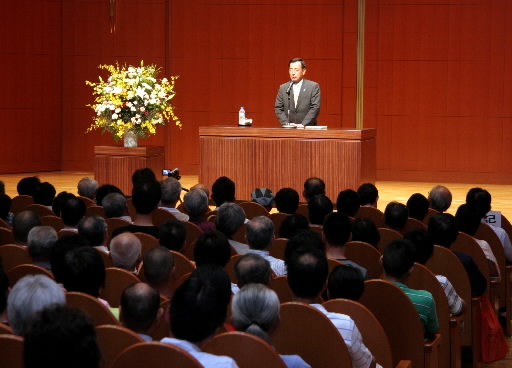Nuclear weapons can be eliminated: Chapter 6, Part 5
Jul. 30, 2009
Chapter 6: Instability in Northeast Asia
Part 5: Nuclear armament
by Keisuke Yoshihara and Yumi Kanazaki, Staff Writers
Self-contradiction in advocacy of nuclear abolition
On June 20 a crowd of 300 filled the Hatsukaichi Bunka Hall Sakurapia to hear Toshio Tamogami speak. Mr. Tamogami, 60, was dismissed from his post as chief of staff of Japan’s Air Self-Defense Force after disputing the government’s official views on history, saying it was incorrect to state that Japan was “an aggressor nation” in World War II. Before beginning his remarks, Mr. Tamogami jokingly referred to himself as “a dangerous person.”
Mr. Tamogami is not alone in asserting that Japan must acquire nuclear weapons. Though he did not address that issue in his speech in Hatsukaichi, he is scheduled to give a speech in Hiroshima on August 6 on the topic of “Disputing the Peace of Hiroshima.” When asked by a Chugoku Shimbun reporter what he would talk about on the anniversary of the atomic bombing, he said, “I’ll discuss nuclear weapons, among other things. They’ll never be used, but whether or not a country possesses them makes a tremendous difference in its influence in the international community. It’s better to have them.”
The argument that Japan should arm itself with nuclear weapons in order to offset the power of North Korea, which is proceeding with a nuclear weapons development program, has gained favor among some. Japan, which possesses large quantities of plutonium, albeit for civilian use, is sometimes regarded by the international community as having the potential to possess nuclear weapons.
Is Japan’s nuclear armament possible?
Ikuo Anzai, 69, a nuclear engineer and honorary director of the Kyoto Museum for World Peace at Ritsumeikan University, speculated that Japan could develop nuclear weapons within six months to three years if it decided to do so. “Using plutonium for nuclear weapons is not that simple, and the U.S. can’t be expected to provide the know-how. But if it’s just a matter of a simple atomic bomb, a nuclear test is not essential.”
Masahiko Asada, 51, a professor of international law at the Graduate School of Law at Kyoto University, said, “If Japan violates international regulations to possess nuclear weapons, it may be subject to economic sanctions like North Korea.”
Among the international regulations are the Nuclear Non-proliferation Treaty (NPT), the Comprehensive Test Ban Treaty (CTBT), and the Japan-U.S. Nuclear Cooperation Agreement. Article 10 of the NPT allows nations to leave the treaty only if “extraordinary events, related to the subject matter of this Treaty, have jeopardized the supreme interests of its country.” Although the CTBT has not yet been implemented, Japan has ratified it. In order to conduct a nuclear test, Japan would have to take measures to withdraw from the treaty. The withdrawal from a treaty by a nation which has ratified it is nearly unprecedented in the international community.
“If, for example, Japan were to leave the NPT framework, it would no longer be able to get uranium for use as fuel in nuclear power generation, and would be asked to give back the fuel it has. If Japan’s nuclear power plants go out of operation, there will be a tremendous impact on the daily lives of ordinary citizens,” Mr. Asada said.
North Korea is believed to have proceeded with its nuclear development despite being aware that it would lead to protests by the international community and that its citizens would suffer as a result. And the notion that resolving matters through dialogue is difficult, promotes the feeling in Japan that the answer to nuclear weapons is nuclear weapons.
“Japan has made contributions to the field of nuclear non-proliferation,” said Yosuke Naoi, 50, senior principal engineer at the Nuclear Nonproliferation Science and Technology Center of the Japan Atomic Energy Agency. “Whether or not to risk the loss of international credibility in order to acquire nuclear weapons is entirely up to the government.”
Japan would have to pay too high a price for nuclear armament. As the only nation to suffer nuclear attack, Japan chose not to possess nuclear weapons after the war and has continued to call for their abolition. The nation’s nuclear armament will lead to the negation of this post-war history and of the persuasiveness of Japan’s argument against nuclear weapons.
(Originally published on July 15, 2009)
To comment on this article, please click the link below. Comments will be moderated and posted in a timely fashion. Comments may also appear in the Chugoku Shimbun newspaper.








